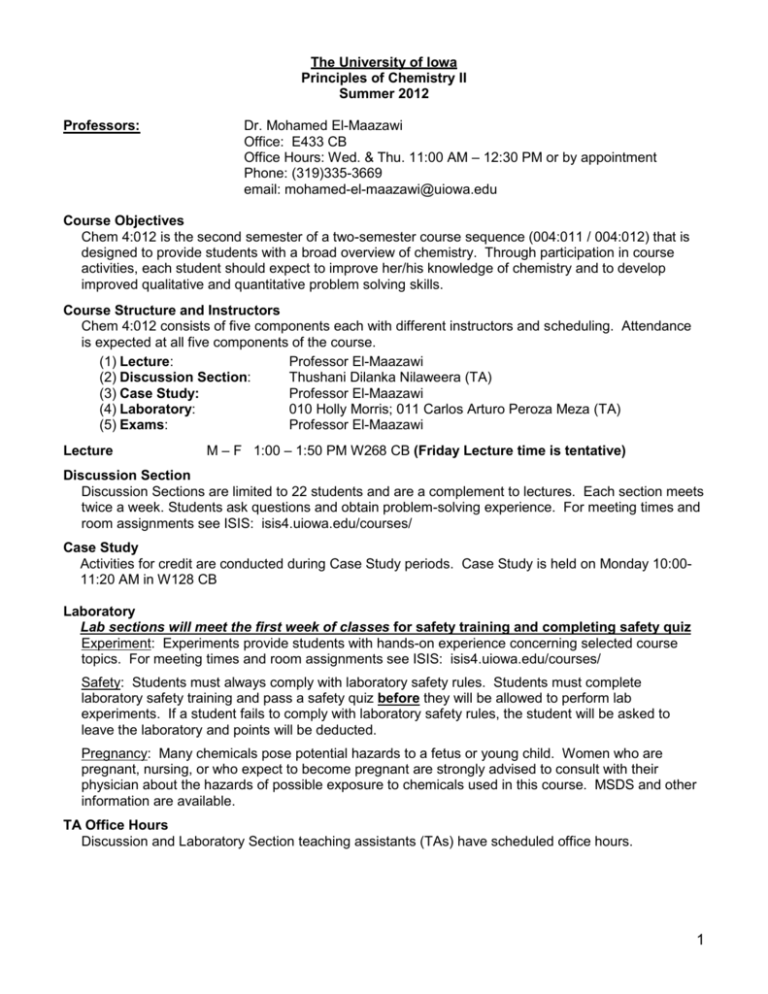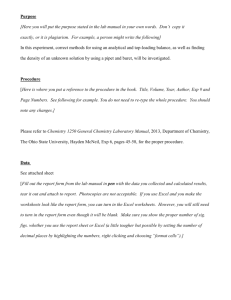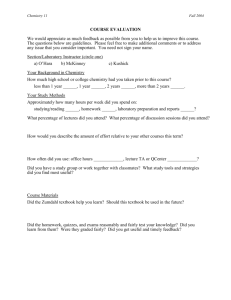
The University of Iowa
Principles of Chemistry II
Summer 2012
Professors:
Dr. Mohamed El-Maazawi
Office: E433 CB
Office Hours: Wed. & Thu. 11:00 AM – 12:30 PM or by appointment
Phone: (319)335-3669
email: mohamed-el-maazawi@uiowa.edu
Course Objectives
Chem 4:012 is the second semester of a two-semester course sequence (004:011 / 004:012) that is
designed to provide students with a broad overview of chemistry. Through participation in course
activities, each student should expect to improve her/his knowledge of chemistry and to develop
improved qualitative and quantitative problem solving skills.
Course Structure and Instructors
Chem 4:012 consists of five components each with different instructors and scheduling. Attendance
is expected at all five components of the course.
(1) Lecture:
Professor El-Maazawi
(2) Discussion Section:
Thushani Dilanka Nilaweera (TA)
(3) Case Study:
Professor El-Maazawi
(4) Laboratory:
010 Holly Morris; 011 Carlos Arturo Peroza Meza (TA)
(5) Exams:
Professor El-Maazawi
Lecture
M – F 1:00 – 1:50 PM W268 CB (Friday Lecture time is tentative)
Discussion Section
Discussion Sections are limited to 22 students and are a complement to lectures. Each section meets
twice a week. Students ask questions and obtain problem-solving experience. For meeting times and
room assignments see ISIS: isis4.uiowa.edu/courses/
Case Study
Activities for credit are conducted during Case Study periods. Case Study is held on Monday 10:0011:20 AM in W128 CB
Laboratory
Lab sections will meet the first week of classes for safety training and completing safety quiz
Experiment: Experiments provide students with hands-on experience concerning selected course
topics. For meeting times and room assignments see ISIS: isis4.uiowa.edu/courses/
Safety: Students must always comply with laboratory safety rules. Students must complete
laboratory safety training and pass a safety quiz before they will be allowed to perform lab
experiments. If a student fails to comply with laboratory safety rules, the student will be asked to
leave the laboratory and points will be deducted.
Pregnancy: Many chemicals pose potential hazards to a fetus or young child. Women who are
pregnant, nursing, or who expect to become pregnant are strongly advised to consult with their
physician about the hazards of possible exposure to chemicals used in this course. MSDS and other
information are available.
TA Office Hours
Discussion and Laboratory Section teaching assistants (TAs) have scheduled office hours.
1
Course Content and Prerequisites
Content: properties of solutions, chemical kinetics, nuclear chemistry, aqueous equilibria, chemical
thermodynamics, electrochemistry, chemistry of the representative elements, coordination
compounds, and organic chemistry.
Prerequisites: Chem 004:011 − Principles of Chemistry I, or its equivalent.
Course Materials
Chemistry: The Central Science, 12th edition, by T. L. Brown, H. E. LeMay,
B. E. Bursten, C. J. Murphy, Pearson/Prentice Hall 2009
MasteringChemistry Access Code
Lab Notebook (w / carbonless copy pages) and laboratory goggles
Case Study / Lab Experiment Manual (Posted on ICON)
Solutions to Exercises for Chemistry: The Central Science11th ed. By Wilson
(required textbook)
(required software)
(required)
(required)
(optional)
Course Websites (Lecture & Lab)
Chem 4:012 − Iowa Courses Online (ICON) website URL = http://icon.uiowa.edu/
Use your Hawk ID and Hawk ID password to log in to ICON. Lecture notes, practice exams, course
announcements, and other information will be posted on ICON, so students are encouraged to check
ICON frequently during the semester.
Online Homework
MasteringChemistry is an Internet-based software package that helps improve problem-solving skills
and concept understanding. MasteringChemistry website: http://www.masteringchemistry.com/
Course Administration
Go to Ms. Jessica Alberhasky, Room E225 CB in the Chemistry Center (phone: 335-1341; e-mail:
jalberha@iowa.uiowa.edu for drop/add signatures, make-up laboratory and exam scheduling, course
handouts, alternate textbooks, section changes, or tutor lists. Hours are M-F, 8:00-12:00 & 1:00-4:30.
Special Needs
Students with disabilities requiring modification of seating, testing, or other course arrangements
should first contact the Office of Student Disability Services, 3101 Burge Hall (335-1462), and then go
to the Chemistry Center, Room E225 CB.
(See also: www.clas.uiowa.edu/faculty/teaching/classroom_p&p/disabilities.shtml)
Complaints
Complaints and appeals regarding this course, its instructors, or TAs can be filed with the
Departmental Executive Officer at the Department of Chemistry administrative offices, Room E331 CB
(335-1350).
Academic Misconduct
The College of Liberal Arts & Sciences academic misconduct policy is available at:
www.clas.uiowa.edu/students/academic_handbook/ix.shtml#1
Academic misconduct may result in a grade reduction and/or other serious penalties.
Examinations: You are expected to work alone. The instructors will employ statistical software to
examine student answer sheets to identify copying on exams – cheating will not be tolerated.
MasteringChemistry (homework): You are expected to individually and independently complete the
homework.
Laboratory: Data collection is a group activity (2 or 4 students). All data is expected to be collected
in the laboratory. Use of data not collected by the author of the report, use of data not acquired
during the lab period, and use of fabricated data will be considered academic misconduct. Case
study, pre-lab, and lab questions may be discussed in groups, but must be answered individually.
2
Policy of the College of Liberal Arts & Sciences
This course is given by the College of Liberal Arts & Sciences. This means that class policies on
matters such as requirements, grading, and sanctions for academic dishonesty are governed by the
College of Liberal Arts & Sciences. Students wishing to add or drop this course after the official
deadline must receive the approval of the Dean of the College of Liberal Arts & Sciences. Details of
the University policy of cross enrollments may be found at:
www.uiowa.edu/~provost/deos/crossenroll.doc
Grading
Semester grades will be based on four 1½ -hour
unit exams, homework, Case Study / Laboratory
work, and Discussion Section participation; plus &
minus grades will be awarded.
4 Unit Exams
Case Study & Lab Experiments
MasteringChemistry homework
Quizzes/Discussion Section
Total
=
=
=
=
=
60%
20%
10%
10%__
100%
Recommended Grade Distribution of the
College of Liberal Arts & Sciences
for Elementary Courses
Grade
A
B
C
D
F
% of Class
15
34
40
8
3
Average GPA = 2.5 out 4.0
Laboratory Component Requirements and Make-up Information
A passing grade in Chem 4:012 requires successful completion of the Case Study / Laboratory portion
of the course. This means: (i) you must receive at least 50% of the Case Study / Laboratory
points, and (ii) you must complete at least five of the six laboratory experiments. If a
Laboratory is missed owing to illness, family emergency, or other qualifying excuse, a “Laboratory
Make-up Request Form” must be submitted to the Chemistry Center. Makeup periods will be
announced. A course grade of Incomplete may be assigned if it is impractical to make up more than
one excused laboratory absence.
Examinations
There are four 2 -hour unit exams. Students should bring their University ID, and a basic scientific
calculator, to each exam. Graphing calculators, programmable calculators or data transmitting
devices (e.g., PDA, laptop, cell phone) will not be allowed in the examination room. Room
assignments will be announced in class and listed on the ICON Chem 4:012 website.
Exam #1: Thursday, June 14,5:00 - 7:00 PM – McBride Hall Aud– Chaps 13 & 19
Exam #2: Thursday, June 28,5:00 - 7:00 PM – McBride Hall Aud – Chaps 16 & 17
Exam #3: Thursday, July 12, 5:00 - 7:00 PM – McBride Hall Aud – Chaps 14 & 20
Exam #4: Thursday, July 26, 5:00 - 7:00 PM – McBride Hall Aud – Chaps 18, 21, 23 & 24
Extra-Credit ACS comprehensive Exam Friday July 27th, 8:30 – 10:30 am (VAN, LR1)
Exams will not be re-scheduled to accommodate vacation or other travel plans.
Make-Up Examinations
If an exam is missed owing to an illness, family emergency, or other university recognized excuse,
to qualify for a make-up exam, written documentation must be submitted to the Chemistry Center
no later than 3 days after the missed exam. Be aware that the instructors consider the use of
dishonest or falsified excuses to be a violation of the University honor code and such situations will
be considered to be cheating.
3
Tentative Course Schedule
Date
June 5
6
7
8
11
12
13
14
14
15
18
19
20
21
22
25
26
27
28
28
29
2
3
4
5
6
9
10
11
12
12
13
16
17
18
19
20
23
24
25
26
26
27
Day
T
W
Th
F
M
T
W
Th
Th
F
M
T
W
Th
F
M
T
W
Th
Th
F
M
T
W
Th
F
M
T
W
Th
Th
F
M
T
W
Th
F
M
T
W
Th
Th
F
Lectures & Exams
CS & Lab
MasteringChemistry
Ch 13 – Properties of Solutions
Safety Quiz
Ch 13
Safety Quiz
Ch 13
Ch 19 – Thermodynamics
Check Deadline in Mastering
Chemistry
Ch 19
Case Study 7
Ch 19
Exp 7
Ch 19
Exp 7
Ch 15 – Review of Chemical Equilib.
Exam 1 – Ch 13 & 19 – (5:00 – 7:00 PM, McBride Hall Aud)
Ch 16 – Acid-Base Equilibria
Ch 16
Case Study 10
Ch 16
Exp 10
Ch 16
Exp 10
Ch 16
Check Deadline in Mastering
Chemistry
Ch 17 – Ionic Equilibria
Ch 17
Case Study 9
Ch 17
Exp 9
Ch 17
Exp 9
Ch 17
Exam 2 – Ch 16 & 17 – (5:00 – 7:00 PM, McBride Hall Aud)
Ch 20 – Electrochemistry
No Case Study
Ch 20
No Lab
Ch 20
Makeup Lab
University Holiday
Ch 20
Check Deadline in Mastering
Chemistry
Ch 20
Ch 14 – Chemical Kinetics
Case Study 12
Ch 14
Exp 12
Ch 14
Exp 12
Ch 14
Exam 3 – Ch 14 & 20 – (5:00 – 7:00 PM, McBride Hall Aud)
Ch 21 – Nuclear Reactions
Ch 21
Case Study 8
Ch 21
Exp 8
Ch 23 – Coordination Compounds
Exp 8
Ch 23
Check Deadline in Mastering
Chemistry
Ch 23
Ch 23
Case Study 11
Ch 24 – Organic Chemistry
Exp 11
Ch 24
Exp 11
Ch 18 – Chemistry of Environment
Exam 4 – Ch 18, 21, 23, 24 – (5:00 – 7:00 PM, McBride Hall Aud)
ACS Comprehensive Exam (8:30 – 10:30 am, in VAN, LR1)
4
Guidelines for Lab Performance
Punctuality: Every 5 minutes results in a loss of 2 points
thus >25 minutes -10 points
30 minutes late – cannot do lab unless a special permission is obtained from Dr. ElMaazawi
Preparedness 1 – 3 questions or actions that show a lack of preparation for the lab – ½
point each (questions like “what should I do next?”)
For each additional question –1 point
(No points should be taken off for asking a safety related question)
Participation -1 point if only occasionally contributing to group activities
-2 point if contributing very little
-3 points if just standing there and not even giving suggestions.
Disruption -1 to 5 depending on how disruptive the student is (An example of this
would be completely preventing a group from finishing by doing the experiment
“his/her” way despite what the correct procedure)
Safety -0.5 point for each goggle reminder
-1 point for more serious safety violations (spilling chemicals, leaving an unattended
Bunsen burner, etc)
Distribution of Lab Points:
1) 5 points for Lab Performance (see above)
2) 10 points for being on time and performing the lab activities in a proper manner.
3) 5 points for quality of results.
a. Less than 10% from the correct value(s) – no loss of points
b. Between 10 and 20% of the correct value – loss of 2 points
c. 20% or more – loss of 4 points
4) 5 points for the discussion and conclusions section including answering the questions
5) 5 points for each case study activity
6) 5 points for each prelab activity
5
Teaching Policies & Procedures: Syllabus Insert
Administrative Home
The College of Liberal Arts and Sciences is the administrative home of this course and governs matters
such as the add/drop deadlines, the second-grade-only option, and other related issues. Different
colleges may have different policies. Questions may be addressed to 120 Schaeffer Hall, or see the
CLAS Student Academic Handbook.
Electronic Communication
University policy specifies that students are responsible for all official correspondences sent to their
University of Iowa e-mail address (@uiowa.edu). Faculty and students should use this account for
correspondences. (Operations Manual, III.15.2. Scroll down to k.11.)
Accommodations for Disabilities
A student seeking academic accommodations should first register with Student Disability Services and
then meet privately with the course instructor to make particular arrangements. See
www.uiowa.edu/~sds/ for more information.
Academic Fraud
Plagiarism and any other activities when students present work that is not their own are academic fraud.
Academic fraud is a serious matter and is reported to the departmental DEO and to the Associate Dean
for Undergraduate Programs and Curriculum. Instructors and DEOs decide on appropriate
consequences at the departmental level while the Associate Dean enforces additional consequences at
the collegiate level. See the CLAS Academic Fraud section of the Student Academic Handbook.
CLAS Final Examination Policies
Final exams may be offered only during finals week. No exams of any kind are allowed during the last
week of classes. Students should not ask their instructor to reschedule a final exam since the College
does not permit rescheduling of a final exam once the semester has begun. Questions should be
addressed to the Associate Dean for Undergraduate Programs and Curriculum.
Making a Suggestion or a Complaint
Students with a suggestion or complaint should first visit the instructor, then the course supervisor, and
then the departmental DEO. Complaints must be made within six months of the incident. See the CLAS
Student Academic Handbook.
Understanding Sexual Harassment
Sexual harassment subverts the mission of the University and threatens the well-being of students,
faculty, and staff. All members of the UI community have a responsibility to uphold this mission and to
contribute to a safe environment that enhances learning. Incidents of sexual harassment should be
reported immediately. See the UI Comprehensive Guide on Sexual Harassment for assistance,
definitions, and the full University policy.
Reacting Safely to Severe Weather
In severe weather, class members should seek appropriate shelter immediately, leaving the classroom if
necessary. The class will continue if possible when the event is over. For more information on Hawk Alert
and the siren warning system, visit the Public Safety web site.
*These CLAS policy and procedural statements have been summarized from the web pages of the
College of Liberal Arts and Sciences and The University of Iowa Operations Manual.
6








